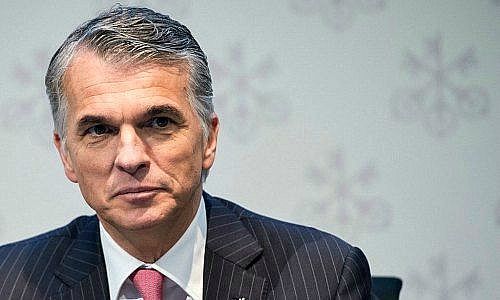In his six years as chief executive of Switzerland’s largest bank, Sergio Ermotti has achieved quite a lot, more than most of his predecessors in any case. But his achievements aren't being held in proper regard, he says.
CEOs of listed companies take the value of their shares as a judgement of their performance. Sergio Ermotti, UBS’ CEO, is no different. The stock of Switzerland’s largest bank has appreciated about 50 percent since he took over from Oswald Gruebel as head of the company six years ago.
During his tenure, UBS has lowered risks, pared the balance sheet, converted the investment bank into a small, but profitable shop, and strengthened its position as biggest wealth manager.
It's Not Fair
Investors and markets have rewarded the bank for these changes, placing the bank somewhere in the middle of the pack, but with a valuation below the big U.S. banks'. Much to the chagrin of Ermotti, as he confessed to the «Financial Times» (behind paywall).
UBS was not the investment bank with the highest valuation, but the wealth manager with the lowest valuation of the world, he told the newspaper. If one compares UBS with Blackrock or Julius Baer, he’s right.
Held Back by Industry Woes
Ermotti knows that UBS still carries the stigma of the high-flying investment bank that crashed. Investors see UBS as a risky bet because it has kept the investment bank.
And regulators at the same time have come down hard on the bank as well, both in Switzerland and in Europe. Seen this way, UBS very much is part of a European financial industry that struggles to escape the crisis, while the U.S. rivals are prospering.
Ermotti feels strongly that putting UBS in the same pot as some other crisis-ridden banks is deeply unfair. Claiming that U.S. banks had tackled their problems earlier and more vigorously was a generalization that didn’t hold up to scrutiny, he says.
How Trump Helps Bankers
Some banks, such as UBS, had done their homework. Others didn’t. And those causing trouble weren’t the investment banks, but the traditional European commercial banks.
Ermotti says that there’s a gulf dividing the U.S. and Europe, and that’s the regulators’ doing. While Trump is letting the banking industry breathe, Europe is tightening the screws ever more. This will eventually make the European financial sector lose its competitive edge, the UBS executive said.
Regulation in Europe has reached its high point and a further tightening would be useless, according to Ermotti. He likened the attempts to further tighten the screws to buying a second insurance policy in case the first failed.


































